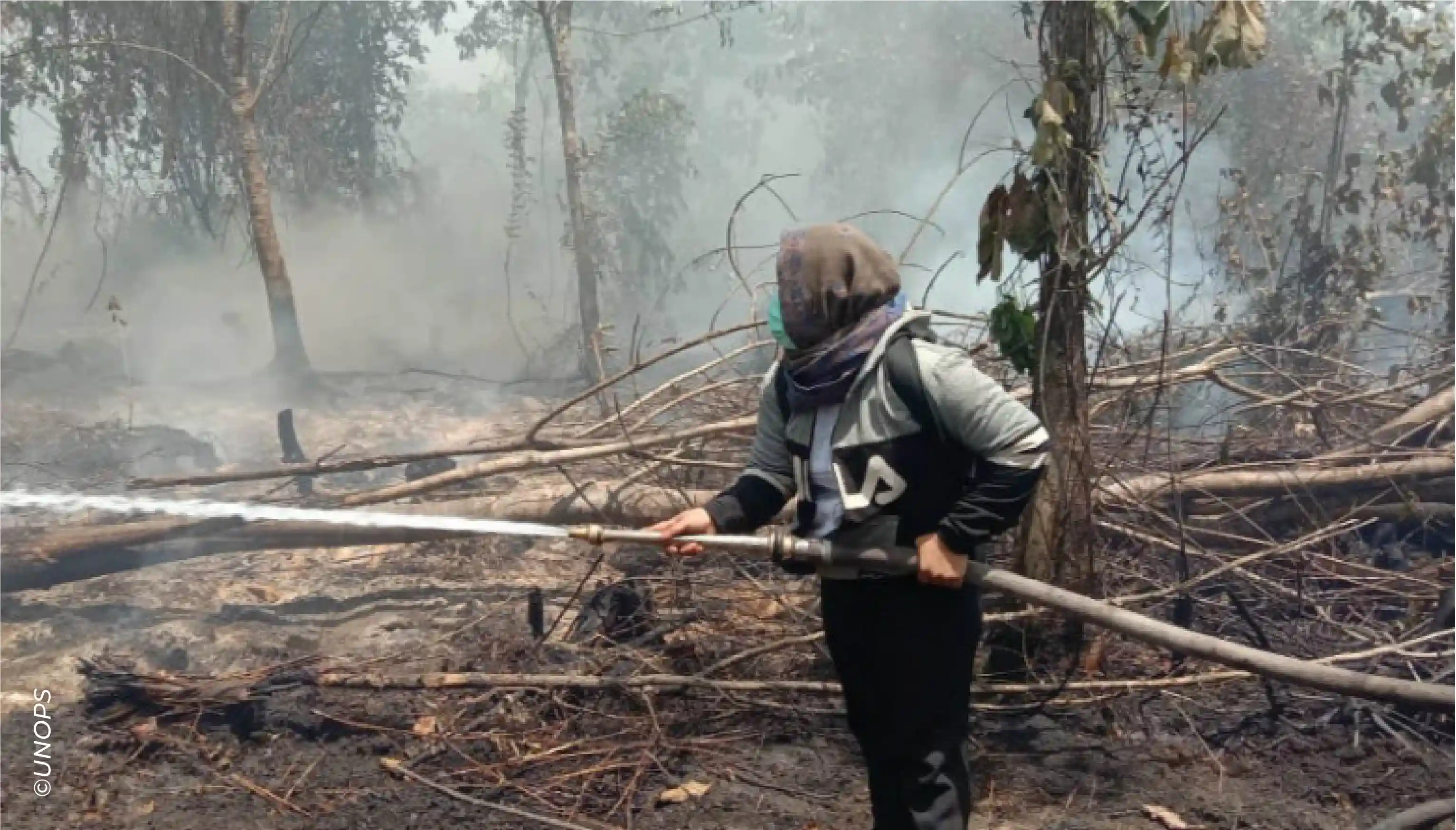United Nations In Indonesia
Country Results Report 2021
Evidence-Based Land Management and Planning



 Forests and rural lands provide an economic lifeline for millions of Indonesians. However, people who depend on agricultural livelihoods, including many indigenous communities, are poorer than the national average. Ministry of Environment and Forestry data from 2017 suggests that of some 9.2 million village households in or at the forest fringe 1.7 million are low-income households.
Forests and rural lands provide an economic lifeline for millions of Indonesians. However, people who depend on agricultural livelihoods, including many indigenous communities, are poorer than the national average. Ministry of Environment and Forestry data from 2017 suggests that of some 9.2 million village households in or at the forest fringe 1.7 million are low-income households.
To boost sustainable livelihoods in some of Indonesia’s most vulnerable communities, an EU- UN forest law enforcement, governance, and trade programme assisted 65 SMEs in Indonesia’s Bengkulu, Sumedang, Yogyakarta, Central Java provinces, and 11 social forestry license holders in Jambi and Central Kalimantan provinces in obtaining national timber legality assurances in 2021. The UN also distributed small capacity-building grants for field monitoring to seven local organizations. In addition, the UN trained 53 forest monitors and production forest management unit officers in the implementation of the timber legality verification system, through which they monitored 126 management units and industries and 14 exporters in Jambi, Central Java, East Java, North Maluku, Central Kalimantan, and South Sulawesi. Further, the UN convened a working group comprising 11 relevant institutions in West Papua tasked with strengthening the interdiction and investigation of illegal timber and wildlife trafficking through the Sorong Port.
In parallel to efforts to ensure responsible logging, the UN launched an e-commerce portal called Kayutopia. com in 2021, to help SMEs in the timber furniture and woodcraft sectors reach wider domestic and international markets. Together with the Ministry on Environment and Forestry, the EU-UN project assisted 12 timber businesses in Banten, West Java, Central Java, East Kalimantan in complying with export-import regulations.
Indonesia’s Ministry of Environment and Forestry is also preparing a draft Presidential Regulation to accelerate integrated social forestry management aimed at boosting community welfare through economic improvement. One of the strategies is to develop partnerships with the private sector to exploit commodities in a way that opens funding opportunities in forestry-related social business development.
In recent years Indonesia has taken measures to successfully reduce the rate of deforestation and maintain forest cover in the country. In 2019, forest cover in Indonesia was recorded at 94.1 million hectares, or 50.1% of the land area, with land not covered by forest recorded at 93.6 million hectares, or 49.9% of the total mainland area of 187.8 million hectares. The country lost 115,460 hectares of forest cover in the 2019 to 2020 period—a 75% drop in deforestation compared to 2018 to 2019, according to figures the Ministry of Environment and Forestry released in March 2021.
However, forest fires remain a perennial hazard. In 2021, Indonesia saw fires burn more than 353,222 ha. of land by the end of November. That is 16% more than the 269,942 hectares the Ministry of Environment and Forestry reported having burned in 2020. To help prevent fires and avoidable drought, the UN supports the Peatland and Mangrove Restoration Agency of the Republic of Indonesia in maintaining the Peatland Restoration Information Management System, or PRIMS, launched in 2019. PRIMS facilitates the effective monitoring of the government’s peatland and mangrove rehabilitation agenda as well as the management of fire risk. The PRIMS project also supports the rehabilitation of water catchment areas where peatlands play a role in storing water reserves in the prolonged dry season. In 2021, the UN helped train journalists to use data from PRIMS to generate reports on fire prevention.
In 2021, the Ministry of Environment and Forestry managed 683 cases of human-wildlife conflict. Additionally, the Ministry released 54,308 individual animals into the wild from captivity, and from conservation areas, including endangered or threatened species detained by poachers.
Responsible land management is necessary for urban as well as rural environments. In 2021, the UN in Indonesia supported the cities of Surabaya and Bandung in reviewing development project planning, developed in collaboration with UK Foreign Commonwealth Development Office and private implementing partners.
The UN also piloted an SDG Project Assessment tool for urban projects, in relation to the development of an integrated public transport system in Bandung and two city projects on urban regeneration and earthquake preparedness in Surabaya. In Bandung, the transport modernization project requires collaboration with informal sector workers while incorporating voices of women, children and youths, and people with disabilities to develop an integrated public transport system. In Surabaya, the urban regeneration of Putat Jaya requires collaboration with stigmatized women and marginal communities of at former red-light district. Meanwhile, the Surabaya earthquake and response preparedness project required incorporating the needs of people with disabilities. The UN’s SDG Project Assessment tool assisted the cities and UK development partners in assessing the breadth of issues to be addressed and the stakeholders to be consulted, including the specialized institutions that would have to be engaged to develop the proposed urban projects.